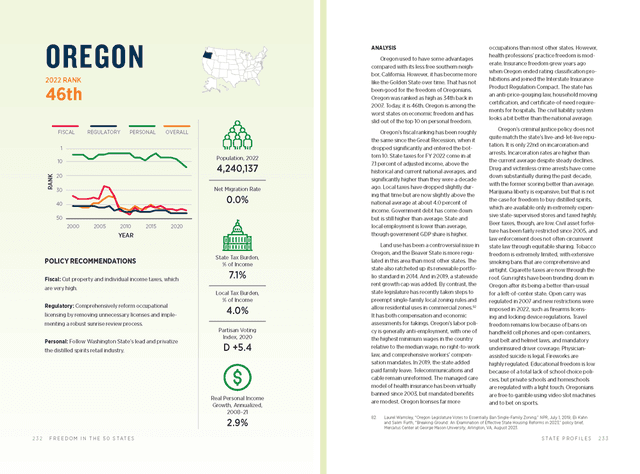Policy Recommendations
- Fiscal Cut property and individual income taxes, which are very high.
- Regulatory Comprehensively reform occupational licensing by removing unnecessary licenses and implementing a robust sunrise review process.
- Personal Follow Washington State’s lead and privatize the distilled spirits retail industry.
Analysis
Oregon used to have some advantages compared with its less free southern neighbor, California. However, it has become more like the Golden State over time. That has not been good for the freedom of Oregonians. Oregon was ranked as high as 34th back in 2007. Today, it is 46th. Oregon is among the worst states on economic freedom and has slid out of the top 10 on personal freedom.
Oregon’s fiscal ranking has been roughly the same since the Great Recession, when it dropped significantly and entered the bottom 10. State taxes for FY 2022 come in at 7.1 percent of adjusted income, above the historical and current national averages, and significantly higher than they were a decade ago. Local taxes have dropped slightly during that time but are now slightly above the national average at about 4.0 percent of income. Government debt has come down but is still higher than average. State and local employment is lower than average, though government GDP share is higher.
Land use has been a controversial issue in Oregon, and the Beaver State is more regulated in this area than most other states. The state also ratcheted up its renewable portfolio standard in 2014. And in 2019, a statewide rent growth cap was added. By contrast, the state legislature has recently taken steps to preempt single-family local zoning rules and allow residential uses in commercial zones. It has both compensation and economic assessments for takings. Oregon’s labor policy is generally anti-employment, with one of the highest minimum wages in the country relative to the median wage, no right-to-work law, and comprehensive workers’ compensation mandates. In 2019, the state added paid family leave. Telecommunications and cable remain unreformed. The managed care model of health insurance has been virtually banned since 2003, but mandated benefits are modest. Oregon licenses far more occupations than most other states. However, health professions’ practice freedom is moderate. Insurance freedom grew years ago when Oregon ended rating classification prohibitions and joined the Interstate Insurance Product Regulation Compact. The state has an anti-price-gouging law, household moving certification, and certificate-of-need requirements for hospitals. The civil liability system looks a bit better than the national average.
Oregon’s criminal justice policy does not quite match the state’s live-and-let-live reputation. It is only 22nd on incarceration and arrests. Incarceration rates are higher than the current average despite steady declines. Drug and victimless crime arrests have come down substantially during the past decade, with the former scoring better than average. Marijuana liberty is expansive, but that is not the case for freedom to buy distilled spirits, which are available only in extremely expensive state-supervised stores and taxed highly. Beer taxes, though, are low. Civil asset forfeiture has been fairly restricted since 2005, and law enforcement does not often circumvent state law through equitable sharing. Tobacco freedom is extremely limited, with extensive smoking bans that are comprehensive and airtight. Cigarette taxes are now through the roof. Gun rights have been trending down in Oregon after its being a better-than-usual for a left-of-center state. Open carry was regulated in 2007 and new restrictions were imposed in 2022, such as firearms licensing and locking device regulations. Travel freedom remains low because of bans on handheld cell phones and open containers, seat belt and helmet laws, and mandatory underinsured driver coverage. Physician-assisted suicide is legal. Fireworks are highly regulated. Educational freedom is low because of a total lack of school choice policies, but private schools and homeschools are regulated with a light touch. Oregonians are free to gamble using video slot machines and to bet on sports.

